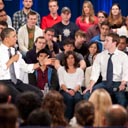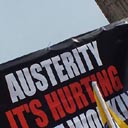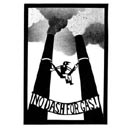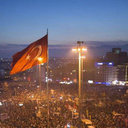
This week, Sarah Jaffe and guest host Bryce Covert round up the week’s labor news and chat about work-family policy on the federal, state, and local level. They also discuss the government shutdown with Mariya Strauss, a labor journalist whose partner is a federal employee.

Facebook CEO Mark Zuckerberg claims that his new lobbying group, FWD.us, “can change everything.” But like Facebook’s other top-down “revolutions,” FWD conflates the leadership of the powerful with transformation for all, and efficient corporate recruiting with improving the lives of immigrant workers.

Despite widespread economic problems and suffering, there has been no upsurge in support for the European left. The articles in this section examine left parties’ current attempts to deal with these challenges.

Over the last decade, as many as 100,000 Mexicans have been killed in drug-related violence. The fighting is sustained by consumer demand for drugs and guns from the United States, but for most Americans the contours of the conflict remain obscure. A leading Mexican investigative journalist talks about her newly-translated book, Narcoland.

This week on Belabored: a message from departing co-host Josh Eidelson and a roundup of labor news from New York to Bangladesh. Then, Sarah Jaffe interviews longtime organizer and union strategist Stephen Lerner about fighting Wall Street, organizing around debt, and the recent fast food strikes.

Despite Bulgaria’s ascension to the EU in 2007, organized crime has continued unabated and no panacea from Brussels has materialized. The corruption has driven Bulgarians into the streets for the first time since the fall of Communism.

It is no longer clear that social democracy possesses a coherent and compelling political identity. But it is clear that social democracy has one important thing going for it: the serious commitment to democracy.

This week on #Belabored: Occupy celebrates a birthday, labor rights for domestic workers, workers centers under fire, and deep cuts for food stamps. Then, Sarah Jaffe breaks down the interplay between unions, judges, and politicians in the battles to save New York hospitals from closure.

Perhaps climate change had once seemed too large-scale, or too abstract, for the minutely human landscape of fiction. But the threat seems to have become too pressing to ignore, and less abstract, thanks to a nonstop succession of mega-storms and record-shattering temperatures. Several new novels make climate change central to their plot and setting, appropriating time-honored narratives to accord with our new knowledge and fears.

Marshall Berman, distinguished professor of political science at CUNY and a longtime editor of Dissent, passed away on September 11. In the coming days, we will be posting tributes here from some of the many friends and admirers he left.

In late October 2012, twenty-one activists calling themselves “No Dash for Gas” scrambled up a power station to hold a sit-in three hundred feet up in the sky. Their actions put them at risk of becoming the first British climate activists to be sent to jail. It also revealed troubling collusion between energy companies and the police.

In this week’s Belabored podcast, Josh and Sarah talk about a judge’s ruling against Indiana’s “Right to Work,” a living wage law vetoed in DC, Chicago schools without air conditioning, and steps towards UAW union recognition in the South. Plus a report back on the AFL-CIO convention in Los Angeles.

We often consider Le Corbusier’s top-down redevelopment ethos a dead letter from the urban renewal era, a victim of its own mistakes. But neoliberal governance, as in Bloomberg’s New York, has seen the revival of large scale architectural schemes and the return of the all-powerful planner archetype.

There is a general reluctance to judge the effects of U.S. war-making by the same humanitarian criteria we apply to our enemies. Reflection on the history of international law, and on an incident from 1920s Syria, might shed light on the deep roots of this intuition that the way we fight can’t be held to the same standards as the way they do.

“This generation has shown itself and to some extent empowered itself through the Gezi Park protests; the question is whether it can transform itself into some form of organized presence in representative democratic institutions. Democracy thrives on the interplay of formal representative institutions and the energies of civil society and the voices and noise of the streets.”




















